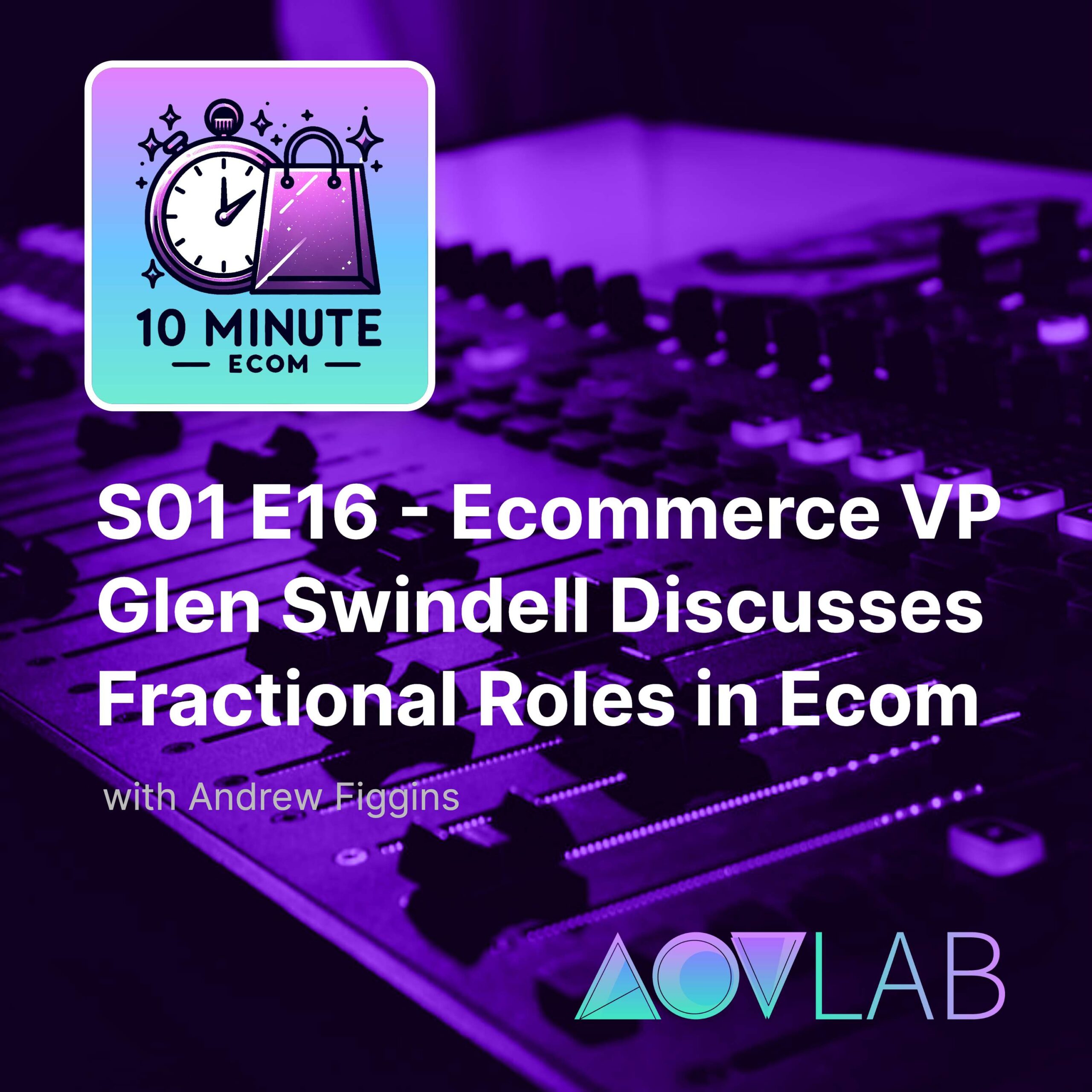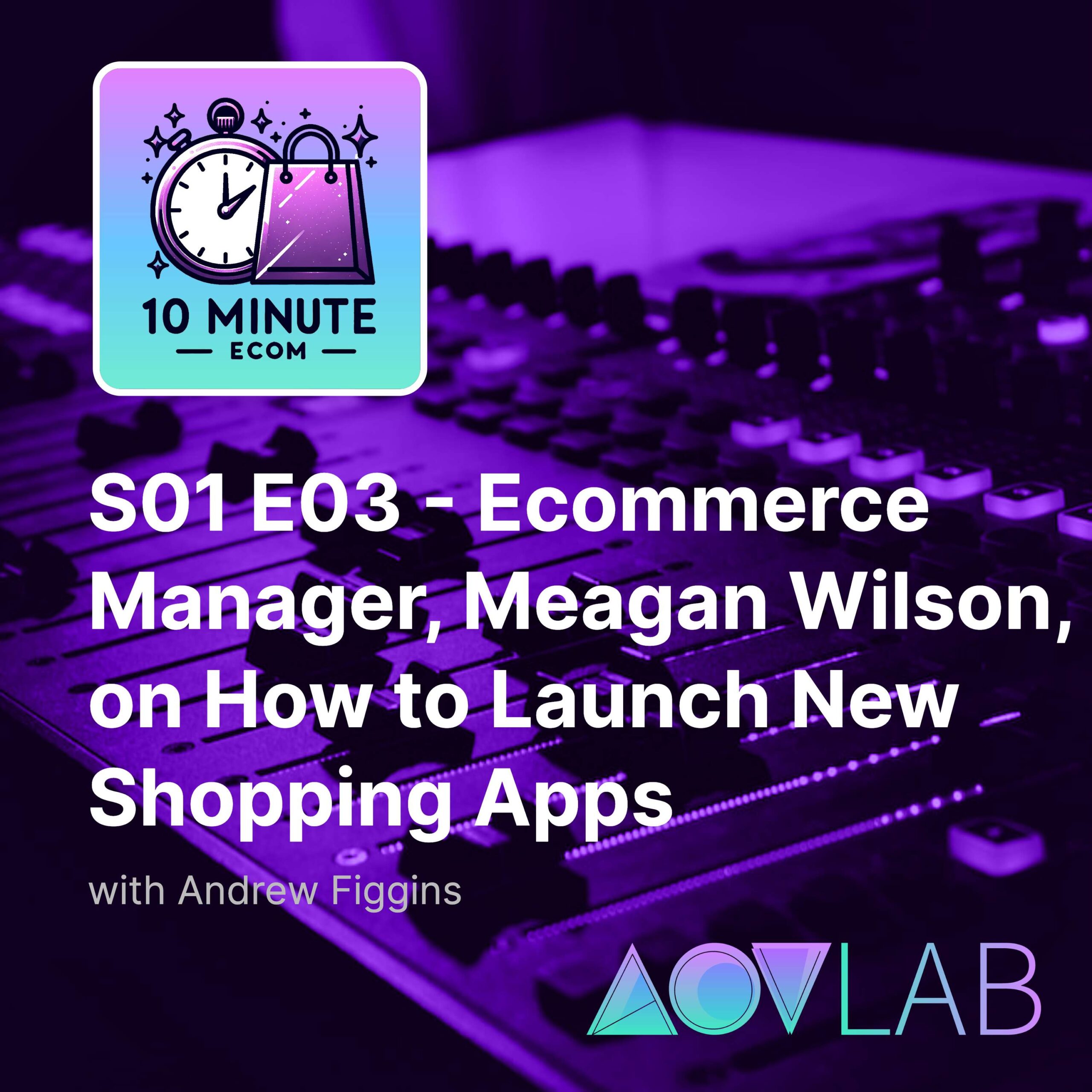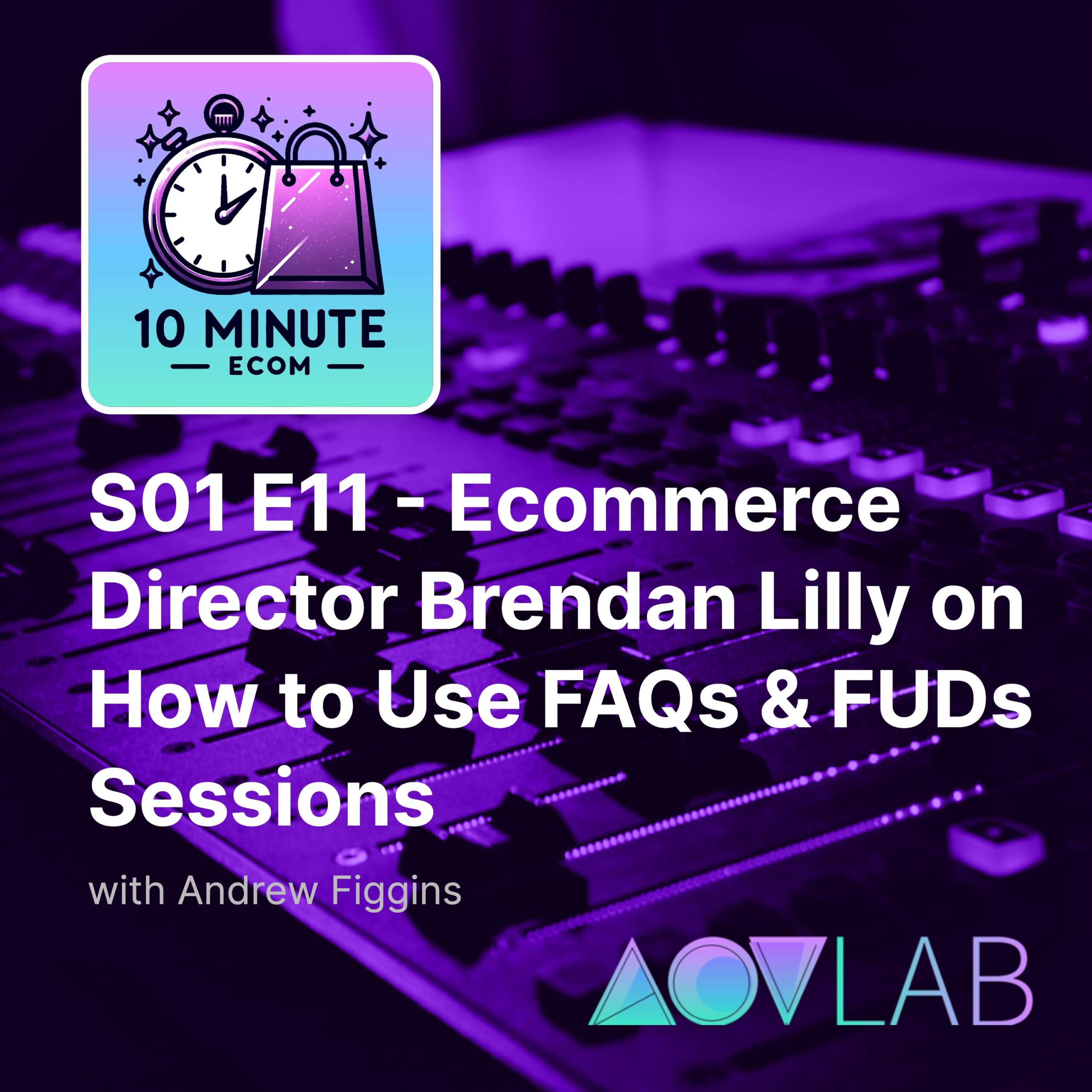Episode Transcript
[00:00:15] Speaker A: Hello, ecommerce fans, and welcome to ten minute ECom and AOV Lab podcast. Every episode, we break down a new and different tactic that can help you improve your ecommerce KP eyes. Key performance indicators I'm your host, Andrew Figgins, and like most of you, I am an e commerce professional. You may know me as the founder of AOV Lab, the former vp of digital product innovation at Scrubs and beyond, the former director of e commerce technology at Rural King, or just from LinkedIn. Today I'm excited to be talking to Max Rudy, an ecommerce colleague that has held a variety of interesting roles in e commerce, including at Wild Planet Foods. Max, what did you come on the show to share today with your e commerce colleagues?
[00:00:59] Speaker B: Hey, everybody, I'm Max Rudy with Wild Planet Foods. I'm out of New York, and I'm the director of e commerce here. The one thing that I've seen that works in Ecom is today talking about fixing your business fundamentals at Amazon.
[00:01:17] Speaker A: Thanks, Max. And I'm excited to get into it.
[00:01:19] Speaker C: Right after the ad.
Today's episode of ten minute ecom is.
[00:01:26] Speaker D: Brought to you by Shopbox AI. I've evaluated hundreds of ecommerce technologies in the last two years, and Shopbox is at the very top of my list. They're an award winning irish team full of innovators that figured out a way.
[00:01:39] Speaker C: To help e comm brands build a.
[00:01:41] Speaker D: Store around every customer, which results in five times longer site sessions. That's not a typo or an ad read mistakeo.
AOV Lab is helping Shopbox break into the north american e comm and retail market, and we're happy to arrange an.
[00:01:58] Speaker C: Intro and demo so you can see.
[00:02:00] Speaker D: Exactly how their add on technology works. To deliver outsized results, go to aov Lab.com and click on Vendor network to set up your 30 minutes discovery call with Shopbox. And now back to the show.
[00:02:14] Speaker C: Excellent, Max. And I'm so excited to talk to you today. I was wondering if you're going to say the one thing that works in ECom is you, because we've had this great conversation just leading up to the recording, and you mentioned a problem that you were facing at wild planet that I encounter. A ton of companies, they face the same issue, which is they're selling into these marketplaces like Amazon and Walmart, and it's almost like an assumption that it has to be unprofitable. And that sounds like it's something that you came into at Wild Planet and you were able to turn that completely around 180 degrees. Love to hear you talk about that today a little bit.
[00:02:54] Speaker B: Yeah, absolutely. So your business on Amazon does not have to be unprofitable. I know we think of it as the de facto search engine for CPG and just that alone in its ability to brand and to get all the marketing tenants. It's a place you have to be, but it doesn't mean you have to lose money on it again. When I came into this business, it was a much more top line focused business. We were acquired by a large company that, surprise, wants bottom line out of their product. Right. They want both top line and bottom line. When you looked at it first, we had not increased pricing. And pricing can be a tough game with Amazon. Our business was scared that Amazon didn't even take price increases and has to do with the fact that, again, Amazon operates completely different than your regular large mass customers or grocery customers, et cetera. So understanding how they operate and how you interact with them and what details you need to bring is very important. As I was telling you before, if you want to win a conversation with Amazon, start with the consumer first.
Make sure that whatever you're proposing somehow benefits the consumer at the end, because Amazon is consumer focused, number one. Number two, they're focused on their own profit. So whatever you're proposing, you need to be able to show them that you're going to continue to be profitable, that this isn't going to ruin it, and that you're a partner. And they don't like to use the word partner, but they like people that play ball, right. And so got to do all that. So we had pricing issues that were probably one of the biggest bleeds, but we were also just spending so much in chargebacks. And the month I came in, we had $30,000 alone in just chargebacks in freight penalty because they didn't like how we were shipping things. So I look at those as symptomatic. Those are symptoms of an issue. Amazon, everybody just goes to the fact of, oh, Amazon's just trying to make money off of you in open statements and shortages. And while they may be making money off of you, they're actually trying to incentivize you to follow their plan, which is a completely different plan than any other retailer. But they are incentivizing you to have subject matter experts from your supply chain all the way to your customer service and everywhere in between, so that when they get the product, they can scan it easily and put it into their inventory. That's all they want to do is have their g ten scan cleanly and have it be put into inventory. So that was the first thing is cleaning that up. So I had to shut off products for until we could get it fixed. I shut off a whole part of our business and guess what?
It didn't hurt our top line people switched because we had our whole portfolio on. They went to other products.
So don't be scared to fix problems. Don't be scared to turn things off if it is a problem. I've had products that just don't make money on Amazon. And for whatever reason, they're a product that the company made that just doesn't make a lot of money. And I've taken those off of Amazon. I've sometimes raised prices on them. Because another thing to realize is that the Amazon shopper is not nearly as price sensitive as your grocery shopper as anything else. The proof of that is if you look at the grocery top 100, you'll see that it's dominated by variety packs.
There's been value packs at brick and mortar forever. Right. But they inherently tell you people expect to get a discount on value packs. Variety packs people pay more for because they want the convenience. They're ordering in bulk and they're not as price sensitive. So what you have is you have the ability to make sure that you are priced competitively but premium on Amazon and you need to build that in to cover their high trade spend. You don't have to build that in at Walmart because they're an everyday low price and they have a very low trade spend with your customer. But if you have a high trade spend with your business, you need to be.
And that's another thing. If you're not profitable, you're going to pay for it in points. It's very hard to get Amazon to go down in your points. However, you can move points around to be more effective. You want to get any points you can not in something you don't see something for, but into your promotions, into whatever you can to make it an active bucket for you because there's no sense in paying money in points for something you don't get a benefit out of. And they don't want you to go backwards in points, but they would certainly help shuffle those around. Right.
[00:08:50] Speaker C: That makes sense. Max, I think you were saying as well that for you, the importance of being quote unquote above the fold on Amazon, getting your products to be right where those buyers are was important to you coming into that business. Can you share a little bit more about that as well?
[00:09:08] Speaker B: Yeah. So we're challenger brand that on shelf is maybe like 2% of market category. However, due to the type of buyer and the type of product we have and the fact that the shelf is democratized through money, right? So you don't have to be the big vendor to get that shelf space, you have to pay for it, but you don't have to be general Mills or you don't have to be nestle. And in fact, they like to break those brands down into their own brands and deal with them at that level versus a conglomerate. So you don't have to be that to win on Amazon, you have to have relevancy. People have to like your product and the price and the assortment. So it's really coming down to those things. And then on top of that, Amazon is not a sales channel. It's a logistics channel and a marketing channel. And logistics plus marketing equals sales. It always blows my mind when people just have a whole sales team dedicated to Amazon. What are you doing? I'm sure they're doing plenty. But you need to be working on your logistics game and you need to be getting every dollar back you can in open statements. You need to be getting your chargebacks down to minimal and you need to be working actively with your operations team on that. Your operations team needs to have the north american vendor guidelines. It's boring stuff, but it is so important.
And this is one thing that I put in as soon as I go anywhere, and that is the most important meeting to me, which is the Ops meeting, which is with the people that process my orders every week and fixing those problems each week, week in, week out, to make sure that any issues we're having are being resolved. And again, when we do get a charge back, we look at it as symptomatic of an issue somewhere in that it's not because Amazon, as most people think, just want to make money off of you.
They're fineing and a lot of times they haven't fined for five years on things that they're just starting to enforce, things that cost them a lot of money. Nobody wants to think about the dirty little secret that someone's got to pay for shipping for all of this stuff that goes somewhere, the difference of the other customers. So you just have to have that in mind when you're thinking about the total game and you have to know where all of your money is coming in and coming out. And you need to know how to optimize each one of those buckets.
[00:11:53] Speaker C: Awesome, Max, and thanks so much for joining ten minute EcOM today. Based on the name of the show, we're basically out of time already, which feels like we barely scratched the surface here. But is there anything that you'd like to share with your ecommerce colleague before we head out today?
[00:12:11] Speaker B: If you're someone that isn't an expert in ops and say you're more a marketing person, get uncomfortable. Learn the supply chain. It's more important than learning how to sell to your vendor manager. The supply chain is going to make or break you. And then when it comes to marketing, find your hero products, find your power asins and invest in those and grow your business through your best power asins. And then finally, when you're looking at the competitive overview of the field, if you see products that are also in the top five to ten, look at their assortment, look at their price point. There's something that's going on with your competitive products that's making them number one. People either like the price or they like the assortment. They tend to like it all. Can you emulate that with a product that's competitive? And then that's the key to winning, is listening agnostically, putting your biases in check, and seeing where the opportunity is across the field.
[00:13:16] Speaker C: Thanks so much Max again for coming on the show. And I wouldn't be surprised if we see a few more people go from unprofitability to profitability just by listening to this episode. And that's outstanding. So thanks so much again for coming on, but also by what you shared and its value to our ecommerce community.
[00:13:37] Speaker B: Appreciate it. I hope it helped, Andrew and thank you so much.
[00:13:41] Speaker A: We have hit that ten minute mark, so that's a wrap for today's episode. I want to again thank our guest Max Rudy. Bear with me today. I have a pretty lengthy list of ways that you can support the show. If you have a moment, be sure to subscribe like or follow the show on Apple Podcasts, Spotify, Amazon Music, Google Podcasts, or wherever it is that you listen. You can rate and review the show inside your podcast app as well. If you have a tactic that you'd like to talk about on an upcoming episode, reach out to humans at aov lablab.com and let me know.
You can also go to AOV Lab and check out more episodes of the show as well as our vendor network. If you can spare half an hour to take a demo of any of those technologies within our vendor network, it'll be worth your time. On the vendor network page, you'll find peer tested, proven technologies like optiversal constructor, ecommerce, espresso and Shopbox AI, who we are helping introduce to the US.
I hope you enjoyed this episode of the show. Until next time, this is Andrew figgins signing off and saying have a good one.


